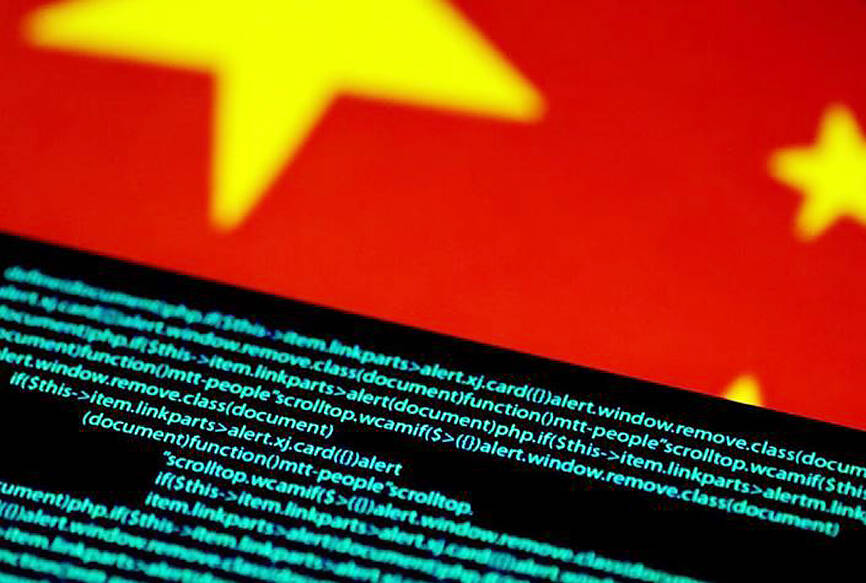An amendment requiring government permission for people working with state-funded core technologies to travel to or transit in China took effect yesterday after the Executive Yuan announced the changes a day earlier.
Lawmakers passed the amendments to articles 9 and 91 of the Act Governing Relations Between the People of the Taiwan Area and the Mainland Area (臺灣地區與大陸地區人民關係條例) in May last year.
The changes revolve around the creation of a regulatory mechanism to control China-bound travel or transit of people who work with core technologies, and safeguards to prevent Beijing-affiliated entities from conducting illicit investments or business operations in Taiwan.

Photo: Reuters
The rules about entities affiliated with Beijing took effect in November last year.
The regulations governing personnel working with core technologies require people, legal persons, institutions and other entities that receive more than a specified level of state funding to obtain permission to travel to China.
The restrictions apply to people, groups and other entities three years after they retire, are discharged from duty or otherwise released from their contractual obligations.
Those who contravene the law face a fine of NT$2 million to NT$10 million (US$65,062 to US$325,309).
The definition of “core technology personnel” and standards for authorizing their China-bound transit or travel were specified by the Executive Yuan.
The National Science and Technology Council is to establish a national core technology evaluation committee to set the definition for “core technology” and make determinations about authorizing transit and travel.
Additionally, entities involved in core technologies that receive more than 50 percent of their funding from the government must submit to the National Immigration Agency and the National Science and Technology Council a list of the people who have access to sensitive technologies.

Taiwan is stepping up plans to create self-sufficient supply chains for combat drones and increase foreign orders from the US to counter China’s numerical superiority, a defense official said on Saturday. Commenting on condition of anonymity, the official said the nation’s armed forces are in agreement with US Admiral Samuel Paparo’s assessment that Taiwan’s military must be prepared to turn the nation’s waters into a “hellscape” for the Chinese People’s Liberation Army (PLA). Paparo, the commander of the US Indo-Pacific Command, reiterated the concept during a Congressional hearing in Washington on Wednesday. He first coined the term in a security conference last

Prosecutors today declined to say who was questioned regarding alleged forgery on petitions to recall Democratic Progressive Party (DPP) legislators, after Chinese-language media earlier reported that members of the Chinese Nationalist Party (KMT) Youth League were brought in for questioning. The Ministry of Justice Investigation Bureau confirmed that two people had been questioned, but did not disclose any further information about the ongoing investigation. KMT Youth League members Lee Hsiao-liang (李孝亮) and Liu Szu-yin (劉思吟) — who are leading the effort to recall DPP caucus chief executive Rosalia Wu (吳思瑤) and Legislator Wu Pei-yi (吳沛憶) — both posted on Facebook saying: “I

The Ministry of Economic Affairs has fined Taobao NT$1.2 million (US$36,912) for advertisements that exceed its approved business scope, requiring the Chinese e-commerce platform to make corrections in the first half of this year or its license may be revoked. Lawmakers have called for stricter enforcement of Chinese e-commerce platforms and measures to prevent China from laundering its goods through Taiwan in response to US President Donald Trump’s heavy tariffs on China. The Legislative Yuan’s Finance Committee met today to discuss policies to prevent China from dumping goods in Taiwan, inviting government agencies to report. Democratic Progressive Party Legislator Kuo Kuo-wen (郭國文) said

The Ministry of Economic Affairs has fined Taobao NT$1.2 million (US$36,900) for advertisements that exceeded its approved business scope and ordered the Chinese e-commerce platform to make corrections in the first half of this year or its license would be revoked. Lawmakers have called for stricter supervision of Chinese e-commerce platforms and more stringent measures to prevent China from laundering its goods through Taiwan as US President Donald Trump’s administration cracks down on origin laundering. The legislature’s Finance Committee yesterday met to discuss policies to prevent China from dumping goods in Taiwan, inviting government agencies to report on the matter. Democratic Progressive Party